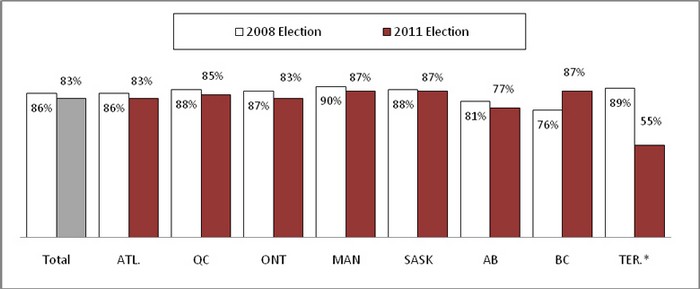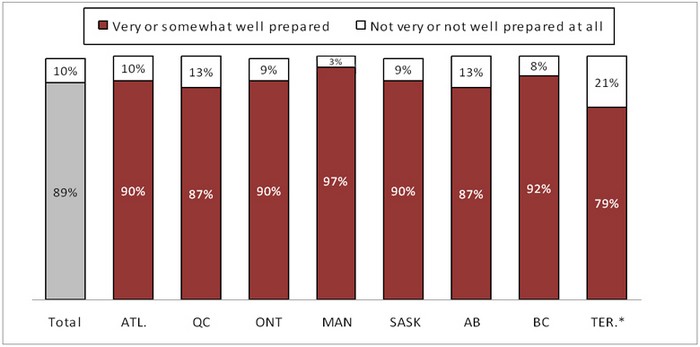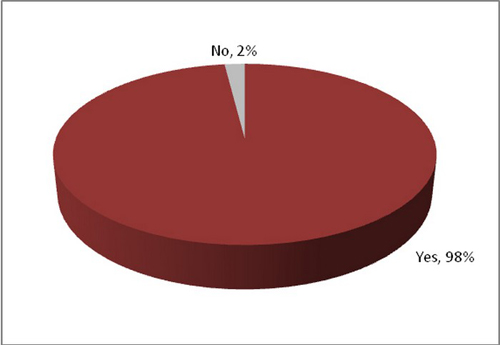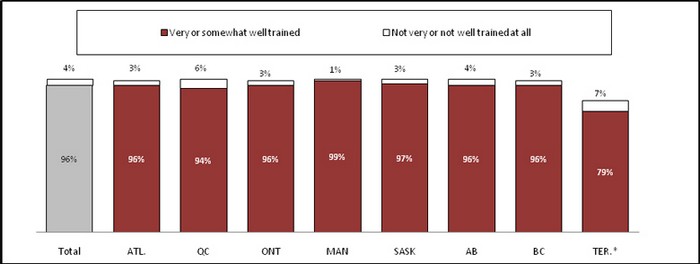Survey of Election Officers following the 41st Federal General Election
Section 6: Preparation for the Election
This section provides a report on the level of preparedness of election officers. This includes an evaluation of the training session, the amount of hours that was spent studying at home and opinions on the voter identification training that was provided.
Level of Preparedness
Overall, election officers felt they had been well prepared to undertake their tasks. Across all regions, 89% reported having been somewhat well prepared or very well prepared, with the largest proportion being in Manitoba (97%). A significantly lower proportion of election officers from Quebec (87%) considered that they had been well prepared.
Q30: "Generally speaking, how well prepared would you say you were to undertake your tasks during the last federal election?" By region (n=3,213)
*Caution should be used when interpreting results due to small sample.
Information officers were significantly more likely to say they had been well prepared (93% vs. 89% overall). When looking at poll types, officers working at an advanced poll were significantly less likely (82%) to be satisfied with their level of preparedness.
| Total | Advance | Ordinary | Mobile | CPS | DRO | IO | |
|---|---|---|---|---|---|---|---|
| Very well prepared | 57% | 50%- | 57%+ | 52% | 53%- | 56%- | 65%+ |
| Somewhat well prepared | 33% | 32% | 33% | 36% | 34% | 34% | 28%- |
| Not very well prepared | 8% | 13%+ | 7%- | 10% | 11%+ | 8% | 4%- |
| Not well prepared at all | 2% | 4%+ | 2%- | 2% | 2% | 3% | 2% |
Evaluation of the Training Session
Virtually all officers (98%) attended the training session that the returning officer provided.
Q31: "Did you attend the training session that the returning officer provided?" (n=3,213)
Eight in ten (83%) were very or fairly satisfied with the session. Overall satisfaction with the training session in 2011 (83%) decreased slightly when compared with 2008 (86%). This is particularly the case in Alberta, where 77% of officers were very or fairly satisfied compared to 81% in 2008. One notable exception is in British Columbia where satisfaction did increase significantly between 2008 (76%) and 2011 (87%).
Information officers were significantly more likely to be satisfied, with 91% being very or fairly satisfied, compared to 78% for central poll supervisors and 83% for deputy returning officers. Those working at advanced polls were less likely (75%) to report being very or fairly satisfied.
Q32: "How satisfied are you with the training session?" By region (2011: n=3,139; 2008: n=3,028)

Text description of graph Q32: "How satisfied are you with the training session?" By region
Percentage rating very/fairly satisfied (combined ratings of 1 and 2 on a 4 point scale).
*Caution should be used when interpreting results due to small sample.
In terms of potential improvements to the training sessions, a variety of suggestions were made. Twelve percent (12%) of the respondents suggested providing more information and more details on the procedures, including voter ID requirements and the closing of polls, but also on any new procedures that may be implemented in the future. The same proportion (12%) suggested allowing more time for the training. Another 6% suggested adding more situations and practical cases, while 4% indicated that better training for supervisors and instructors themselves would be beneficial.
| Total | |
|---|---|
| More info on procedures / more details (closing, ID requirements, new stuff, etc.) |
12% |
| Allow more time for training | 12% |
| Use more examples / situations / practical cases | 6% |
| Supervisors / instructors should receive more training / more experienced | 4% |
Top suggestions.
Officers who worked in advance polls (16%) and mobile polls (18%) were both more likely to request more information or details on the procedures such as closing, ID requirements, etc., when compared to officers in ordinary polls. Deputy returning officers were more likely than other groups to request more time for training (13%) and to recommend more examples, practical cases and situations. Central poll supervisors were more inclined (7%) to suggest increased supervision, training for instructors and more experienced staff.
| Total | Advance | Ordinary | Mobile | CPS | DRO | IO | |
|---|---|---|---|---|---|---|---|
| More info on procedures / more details (closing, ID requirements, new stuff, etc.) | 12% | 16%+ | 12%- | 18%+ | 14% | 13% | 10% |
| Allow more time for training / formation | 12% | 11% | 12% | 14% | 12% | 13%+ | 7%- |
| Use more examples / situations / practical cases | 6% | 5% | 6% | 3% | 6% | 6%+ | 3%- |
| Supervisors/instructors should receive more training / more experienced | 4% | 5% | 4% | 4% | 7%+ | 4% | 2%- |
Training at Home
Most officers (86%) reported having done some training at home, with broad differences across regions. For instance, officers from Atlantic Provinces (93%), Ontario (91%), Manitoba (93%) and British Columbia (92%) were the most likely to have done training at home, while those from Quebec were the least likely (72%) to have done so.
| Total | ATL. | QC | ON | MAN | SASK | AB | BC | TER.* | N. of 50th | STUDENT RES.* | |
|---|---|---|---|---|---|---|---|---|---|---|---|
| Yes | 86% | 93%+ | 72%- | 91%+ | 93%+ | 91% | 87% | 92%+ | 77% | 84% | 92% |
| No | 14% | 7%- | 28%+ | 9%- | 7%- | 9% | 13% | 8%- | 23% | 15% | 8% |
*Caution should be used when interpreting results due to small sample.
Significantly more officers working at mobile polls (95%) did training at home compared to those who worked at advance polls (84%). Information officers were significantly less likely (74%) to do training at home compared to other types of election officers.
| Total | Advance | Ordinary | Mobile | CPS | DRO | IO | |
|---|---|---|---|---|---|---|---|
| Yes | 86% | 84%- | 86% | 95%+ | 91%+ | 88%+ | 74%- |
| No | 14% | 16%+ | 13% | 5%- | 9%- | 11%- | 25%+ |
Election officers who reported having done some training at home claimed to have spent an average of 3.5 hours doing so. As shown below, this average varies across regions.
Officers in Saskatchewan and the Territories reported studying from home significantly more than counterparts in other regions, with an average of 4.2 and 4.3 hours respectively. Quebec officers reported studying from home significantly less than counterparts in other regions, with an average of 3.1 hours.
Q35: "How much time did you spend (Hours)?" By region (n=2,804)

Text description of graph Q35: "How much time did you spend (Hours)?" By region
*Caution should be used when interpreting results due to small sample.
Central poll supervisors reported spending more time studying from home, with an average of 4.5 hours, compared to Information officers who reported spending an average of 2.2 hours studying from home. There were no statistical differences on the average time spent studying reported by type of polling centre (i.e. advance, ordinary, and mobile polls).
Training Related to ID Requirements
In terms of specific training to implement the voter identification requirements, 96% of officers reported being somewhat or very well trained. Those working in advanced polls were significantly less likely than others to report being very well (69%) or somewhat well trained (27%).
Q36: "More specifically, how well trained and prepared would you say you were to implement the voter identification requirements?" By region (n=3,213)
*Caution should be used when interpreting results due to small sample.
Note: 14% of officers in the Territories indicated they did not know or refused to answer how well trained and prepared they were to implement the voter identification requirements.
Looking at the regions, most provinces were similar in the proportion of officers who reported being either very well trained or somewhat well trained regarding the voter ID requirements. While the vast majority of officers felt they were at least somewhat well trained, when comparing provinces to each other, those from Ontario were more likely to report that they were very well trained (72%), whereas those from Saskatchewan (53%) and Alberta (61%) were less likely to say so. Officers in Saskatchewan (45%), Alberta (35%) and Manitoba (36%) were more likely than other provinces to report being somewhat well trained. While a small proportion overall, Quebec officers were more likely than other provinces to report not having been very well trained (4%) and British Columbia officers were more likely to report that they were not well trained at all (2%).
| Total | ATL. | QC | ON | MAN | SASK | AB | BC | TER.* | |
|---|---|---|---|---|---|---|---|---|---|
| Very well trained | 69% | 73% | 69% | 72%+ | 63% | 53%- | 61%- | 68% | 43% |
| Somewhat well trained | 27% | 23% | 25% | 25% | 36%+ | 45%+ | 35%+ | 28% | 37% |
| Not very well trained | 2% | 2% | 4%+ | 2% | 1% | 2% | 2% | 1% | 4% |
| Not well trained at all | 1% | 1% | 1% | 1% | 0% | 0% | 1% | 2%+ | 3% |
*Caution should be used when interpreting results due to small sample.
Officers who worked in ordinary polls were more likely to consider having been very well trained about the voter ID requirements, as opposed to both those who worked either at advance or mobile polls, who were more likely to say they had not been very well trained.
| Total | Advance | Ordinary | Mobile | CPS | DRO | IO | |
|---|---|---|---|---|---|---|---|
| Very well trained | 69% | 64%- | 69%+ | 63% | 68% | 69% | 66% |
| Somewhat well trained | 27% | 27% | 27% | 30% | 28% | 27% | 29% |
| Not very well trained | 2% | 5%+ | 2%- | 5%+ | 3% | 2% | 2% |
| Not well trained at all | 1% | 3%+ | 1%- | 1% | 0% | 1% | 1% |



